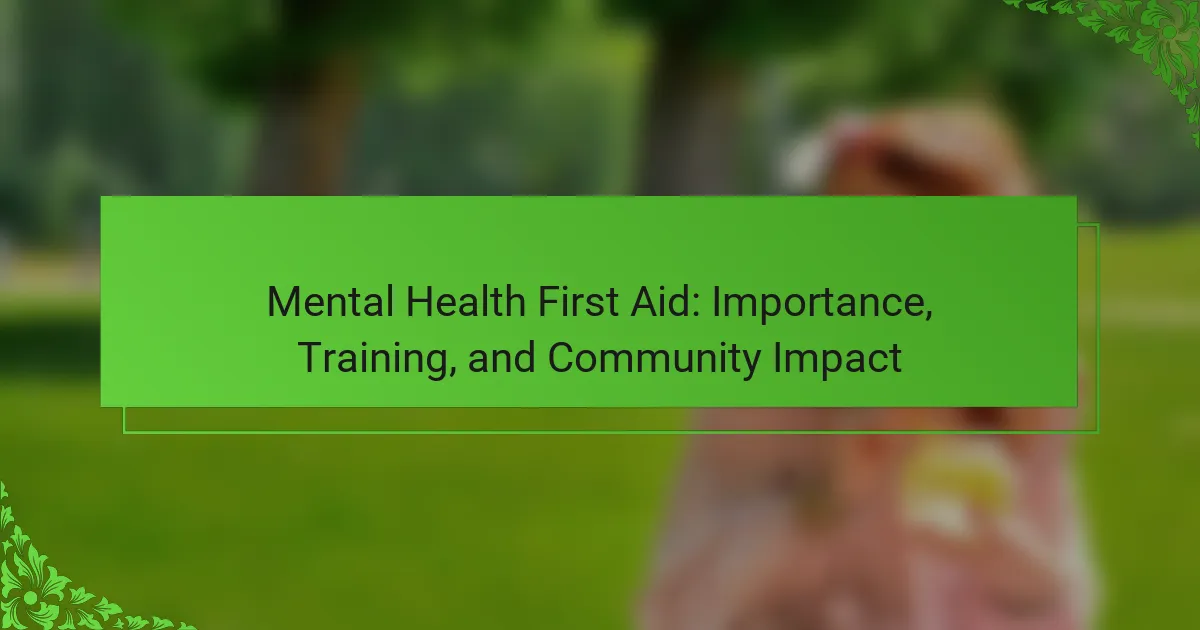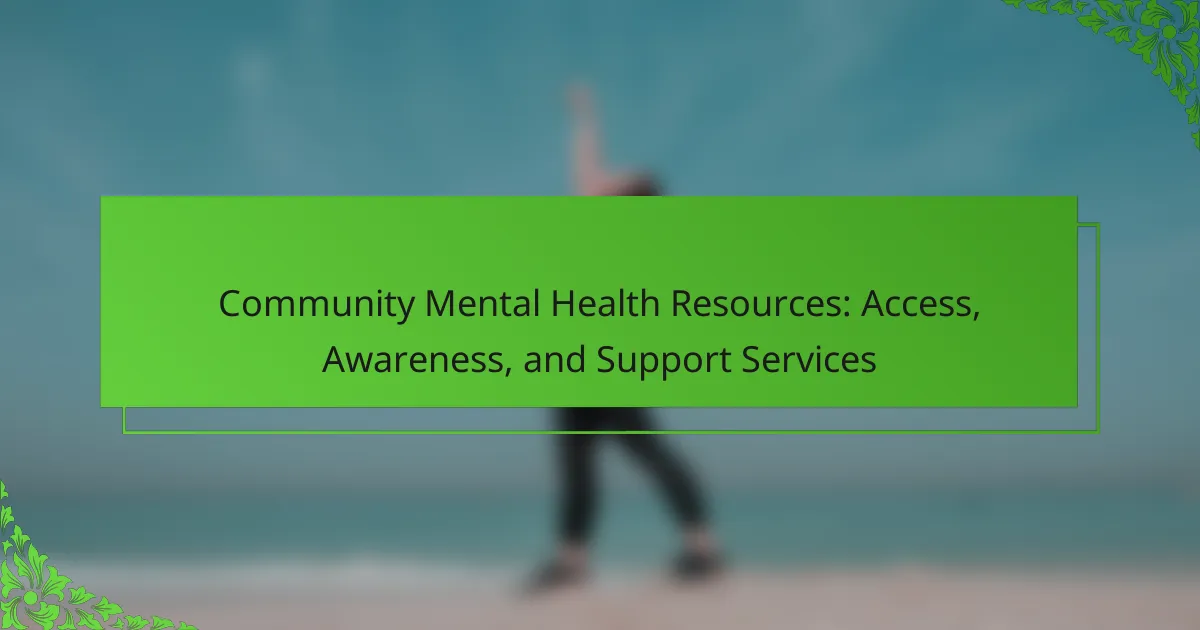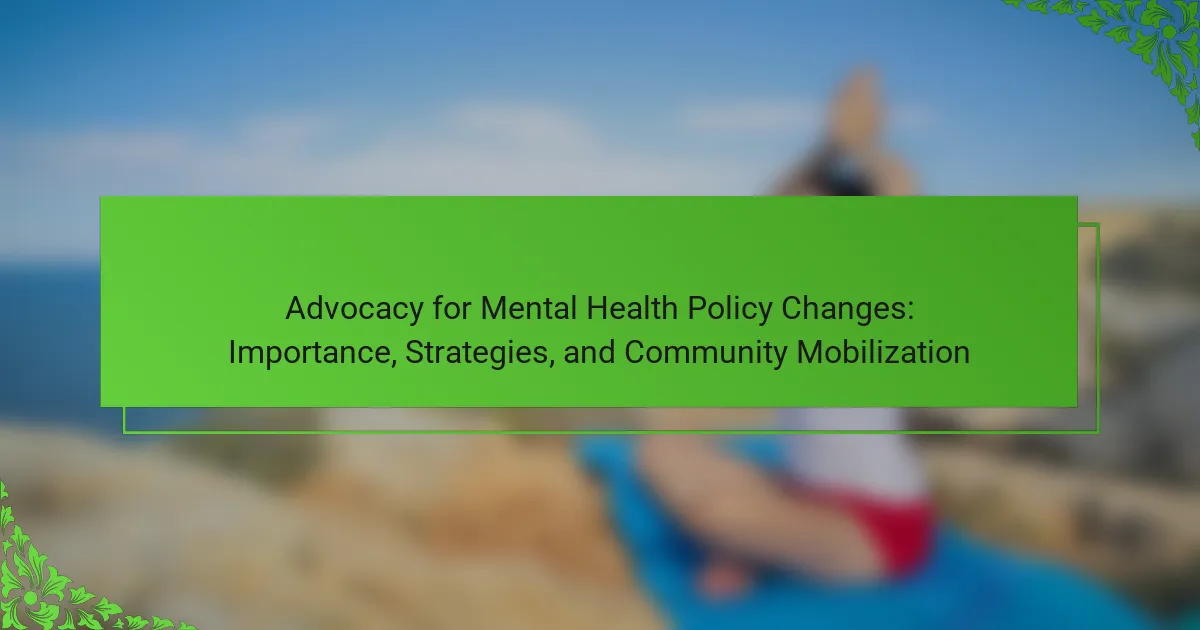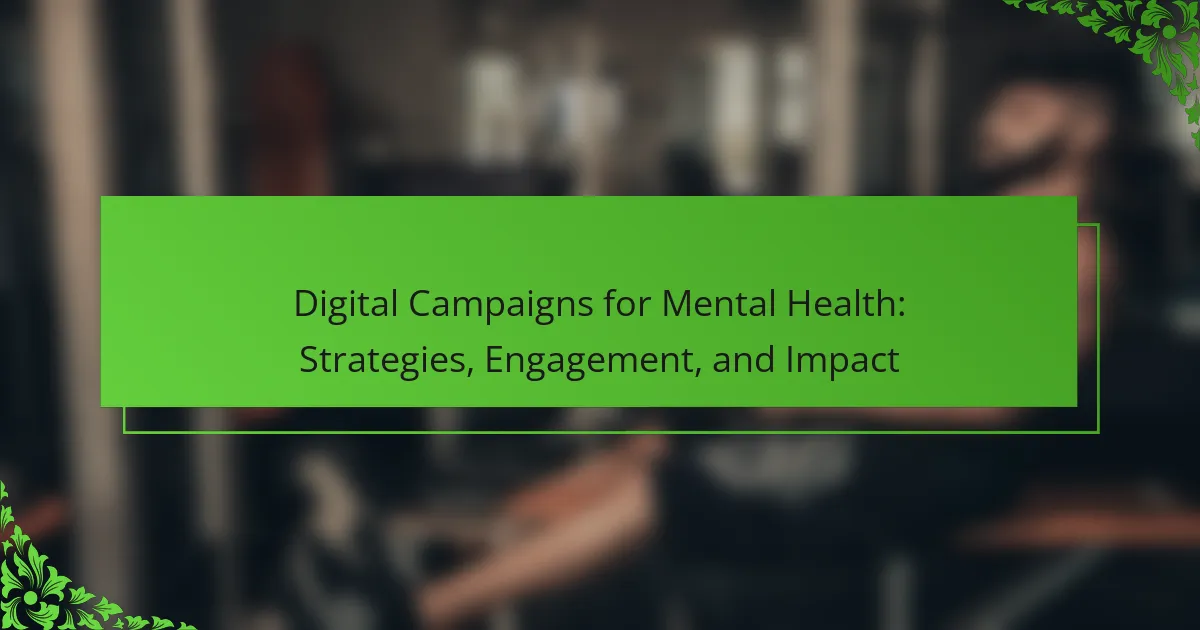Mental Health First Aid is essential for early intervention and support in addressing mental health crises. It provides training to recognize issues, offer immediate help, and guide individuals toward professional resources. This training enhances community awareness, reduces stigma, and improves overall mental well-being. Implementing these programs in workplaces, schools, and organizations fosters resilience and promotes a healthier environment for all.
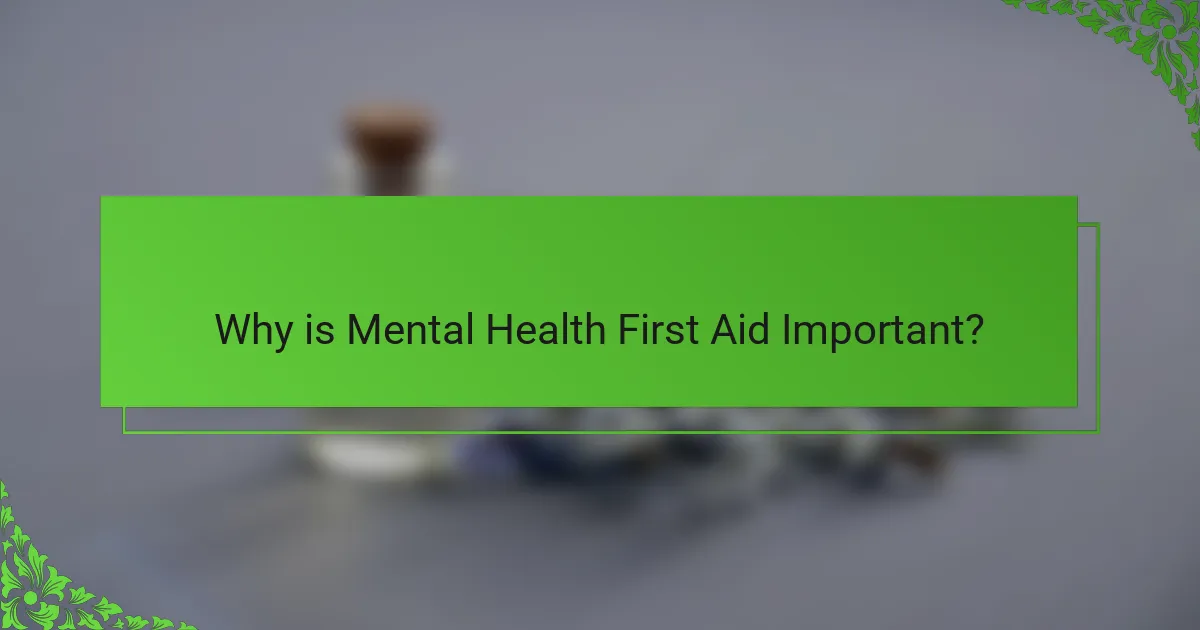
Why is Mental Health First Aid Important?
Mental Health First Aid is crucial for early intervention and support. It equips individuals with skills to recognize mental health issues and provide immediate help. Training fosters community awareness and reduces stigma, promoting a healthier environment. Studies show that trained individuals can significantly improve outcomes for those in distress.
How does Mental Health First Aid contribute to community well-being?
Mental Health First Aid significantly enhances community well-being by equipping individuals with the skills to support those experiencing mental health challenges. This training fosters empathy, reduces stigma, and promotes early intervention, ultimately leading to healthier communities.
Participants learn to recognize signs of mental distress and provide initial help, which can prevent crises. As a result, communities become more resilient and supportive environments. Research indicates that communities with trained individuals experience lower rates of mental health issues and improved overall mental health outcomes.
Moreover, Mental Health First Aid encourages a culture of open dialogue about mental health, further contributing to community well-being. This proactive approach not only benefits individuals but also strengthens community ties and social support networks.
What are the key benefits of Mental Health First Aid training?
Mental Health First Aid training provides essential skills to recognize and respond to mental health crises. Key benefits include improved community awareness, reduced stigma, and enhanced support for individuals in distress. Participants learn to identify signs of mental health issues, offer initial help, and guide individuals toward professional resources. This training fosters a supportive environment that can lead to better mental health outcomes and increased overall well-being in communities.
Which populations are most impacted by Mental Health First Aid initiatives?
Mental Health First Aid initiatives significantly impact various populations, particularly youth, veterans, and marginalized communities. These groups often face higher rates of mental health challenges and may lack access to necessary resources. For example, studies show that youth experience increased anxiety and depression, making them a key demographic for these programs. Additionally, veterans often struggle with PTSD and related issues, benefiting greatly from targeted mental health support. Marginalized communities, including racial minorities, frequently encounter barriers to mental health care, making Mental Health First Aid training essential for improving access and awareness.
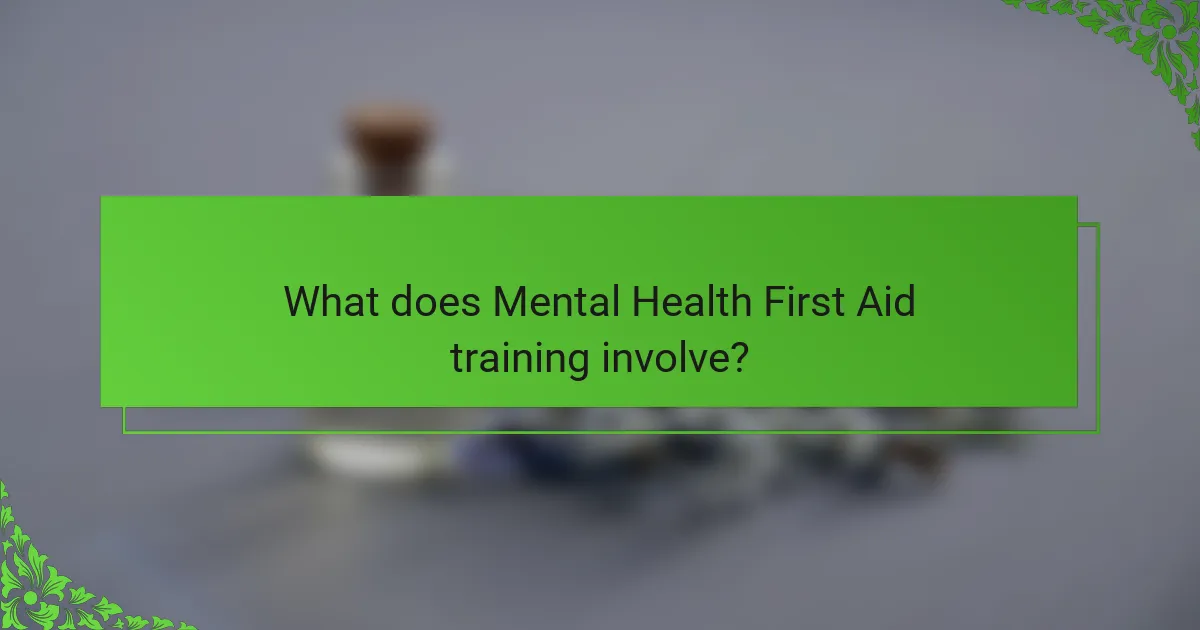
What does Mental Health First Aid training involve?
Mental Health First Aid training involves learning to identify, understand, and respond to mental health crises. Participants gain skills to provide initial support and guide individuals towards professional help. Training covers topics such as mental health conditions, crisis intervention techniques, and the importance of empathy. This knowledge enhances community resilience and promotes mental well-being.
How is Mental Health First Aid training structured?
Mental Health First Aid training is structured into modules that cover key concepts and skills. It typically includes an introduction to mental health, recognition of mental health issues, and intervention strategies. Training sessions often involve interactive activities, role-playing, and discussions to enhance understanding and retention. Participants learn to provide initial support and guidance to individuals experiencing mental health challenges, promoting community awareness and resilience.
What are the core competencies taught in Mental Health First Aid?
Mental Health First Aid teaches core competencies such as recognizing signs of mental health issues, providing initial support, and guiding individuals towards professional help. Participants learn effective communication skills, crisis intervention techniques, and how to reduce stigma around mental health. Additionally, training covers specific mental health conditions and their impact on individuals and communities.
Which organizations provide Mental Health First Aid training?
Organizations providing Mental Health First Aid training include the National Council for Mental Wellbeing, Mental Health First Aid International, and the Red Cross. These organizations focus on equipping individuals with skills to support others in mental health crises. Training programs are often tailored to various community needs, enhancing local support systems.
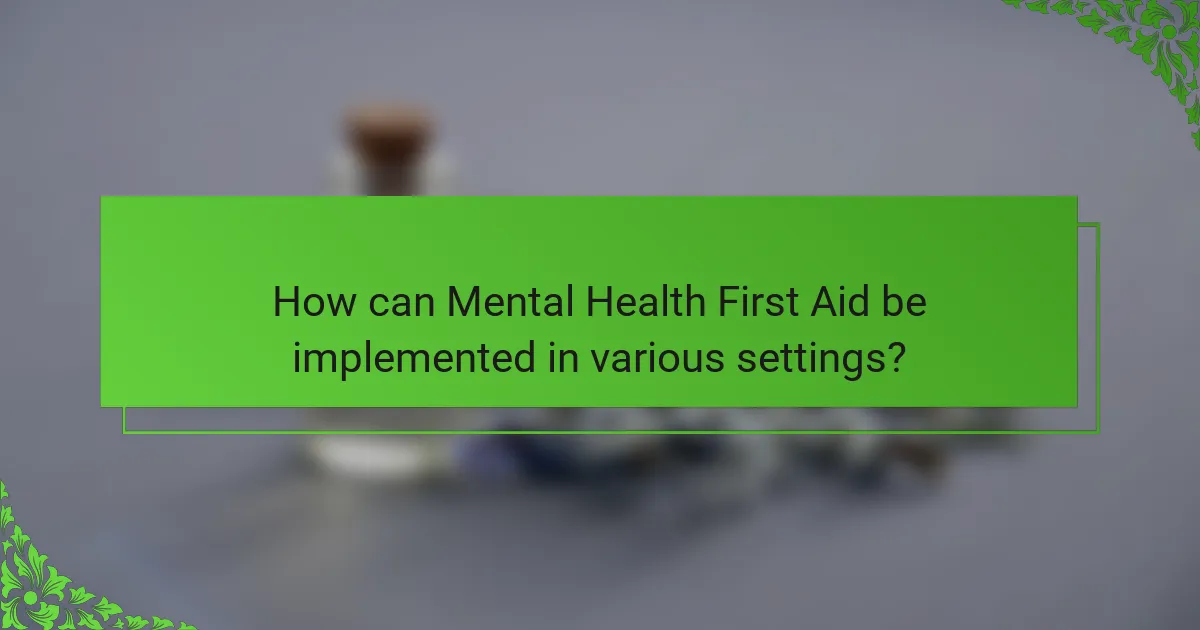
How can Mental Health First Aid be implemented in various settings?
Mental Health First Aid can be effectively implemented in various settings such as workplaces, schools, and community organizations. Training programs tailored to each environment enhance awareness and provide practical skills.
In workplaces, Mental Health First Aid promotes employee well-being, leading to increased productivity and reduced absenteeism. Schools benefit by equipping staff to recognize and respond to students’ mental health issues, fostering a supportive environment. Community organizations can integrate Mental Health First Aid into outreach programs, enhancing access to mental health resources.
The unique attribute of Mental Health First Aid is its adaptability, allowing it to address the specific needs of different populations. As a result, implementation strategies can vary significantly, ensuring relevance and effectiveness in each context.
What role do workplaces play in promoting Mental Health First Aid?
Workplaces play a crucial role in promoting Mental Health First Aid by fostering a supportive environment. They can implement training programs to equip employees with skills to recognize and respond to mental health issues. This proactive approach enhances overall workplace well-being and reduces stigma. Research indicates that organizations with Mental Health First Aid training report a 20% increase in employee confidence to support colleagues in distress. By prioritizing mental health, workplaces contribute to a healthier community and improved productivity.
How can schools integrate Mental Health First Aid into their programs?
Schools can integrate Mental Health First Aid by implementing training programs for staff and students. These programs enhance awareness and equip individuals with skills to support peers in crisis.
First, schools should identify certified trainers to conduct workshops. Regular training sessions ensure that staff remains updated on mental health issues. Additionally, integrating mental health topics into existing curricula promotes a supportive environment.
Involving parents and the community through informational sessions can further strengthen support networks. Schools can also create peer support groups to encourage open discussions about mental health.
Finally, evaluating the impact of these initiatives through surveys helps schools adjust programs to better meet student needs. This comprehensive approach fosters a culture of mental well-being within the school community.
What community resources support Mental Health First Aid initiatives?
Numerous community resources support Mental Health First Aid initiatives, enhancing awareness and training. Local health departments often provide training programs and materials. Nonprofit organizations offer workshops and support networks. Schools and universities may host training sessions for staff and students. Businesses can partner with mental health organizations to facilitate training for employees. Online platforms provide access to virtual courses and resources. Community centers frequently organize events to promote mental health awareness.
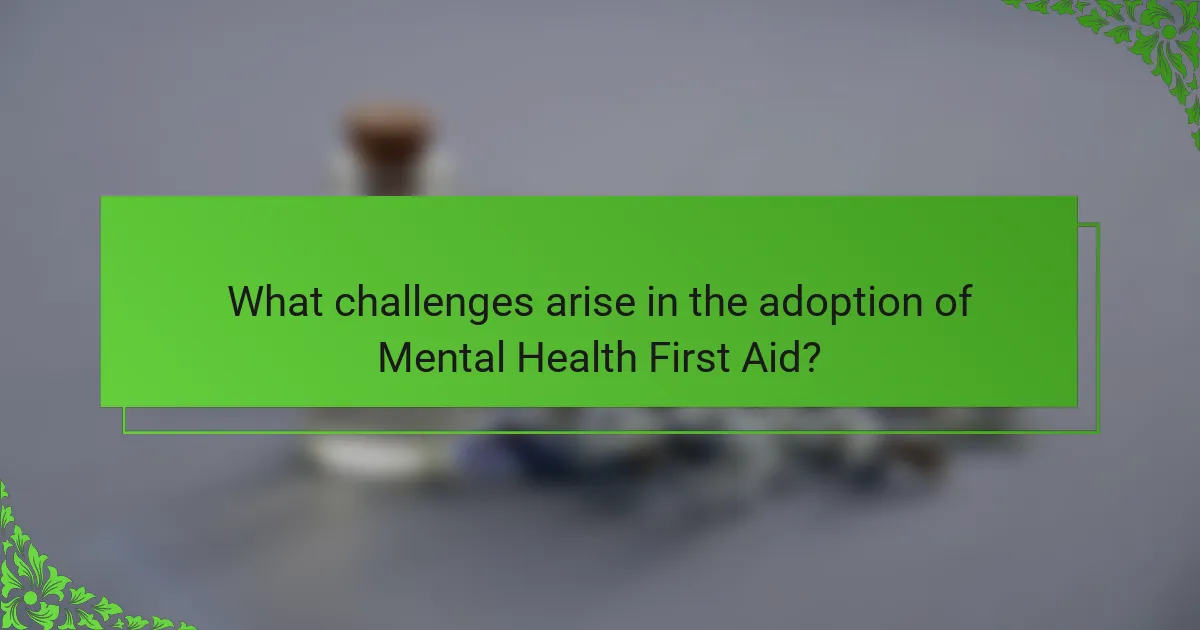
What challenges arise in the adoption of Mental Health First Aid?
Challenges in adopting Mental Health First Aid include stigma, lack of awareness, inadequate training, and resource constraints. Stigma surrounding mental health often discourages individuals from seeking help or participating in training. Many communities are unaware of the benefits of Mental Health First Aid, leading to low enrollment in programs. Inadequate training opportunities can limit the number of certified instructors, reducing access to quality education. Resource constraints, such as funding and time, can hinder program implementation and sustainability. Addressing these challenges is essential for maximizing the impact of Mental Health First Aid in communities.
How do cultural perceptions influence Mental Health First Aid acceptance?
Cultural perceptions significantly influence the acceptance of Mental Health First Aid by shaping attitudes toward mental health. Societal views can either encourage or discourage individuals from seeking help. For instance, in cultures where mental health is stigmatized, people may resist participating in training programs. Conversely, cultures that promote mental well-being often see higher engagement in Mental Health First Aid initiatives. Understanding these cultural nuances is essential for tailoring training and outreach efforts effectively.
What are common misconceptions about Mental Health First Aid?
Common misconceptions about Mental Health First Aid include the belief that it is only for professionals, that it can replace therapy, and that it is solely about suicide prevention. Many think it requires extensive medical knowledge, when in fact, it equips participants with basic skills to assist someone in distress. Additionally, some believe Mental Health First Aid is a one-time training, while ongoing practice and refreshers enhance effectiveness. Understanding these misconceptions can improve community awareness and support for mental health initiatives.
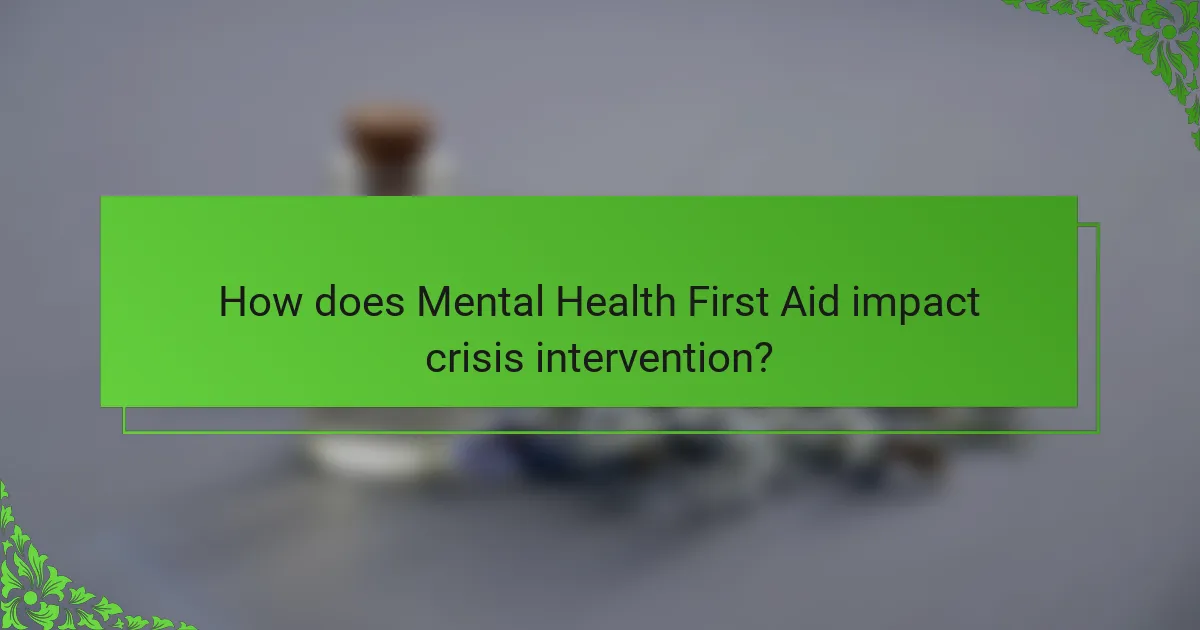
How does Mental Health First Aid impact crisis intervention?
Mental Health First Aid significantly enhances crisis intervention by equipping individuals with essential skills to respond effectively. Trained participants learn to recognize mental health crises, provide immediate support, and guide affected individuals toward professional help. This proactive approach reduces stigma, fosters community awareness, and promotes early intervention, ultimately leading to improved outcomes for those in distress. Studies show that communities with Mental Health First Aid training experience lower rates of emergency interventions, highlighting its impact on crisis management.
What are the outcomes of effective Mental Health First Aid during emergencies?
Effective Mental Health First Aid during emergencies leads to improved emotional resilience, quicker recovery, and reduced long-term psychological effects. Trained individuals can provide immediate support, helping to stabilize those in distress. This intervention fosters a sense of safety and community, enhancing overall mental well-being. Studies show that timely assistance can significantly lower the incidence of conditions like PTSD, demonstrating the critical role of Mental Health First Aid in emergencies.
How can Mental Health First Aid reduce stigma surrounding mental health?
Mental Health First Aid can significantly reduce stigma by promoting understanding and empathy toward mental health issues. Training equips individuals with knowledge to recognize signs of mental distress, fostering supportive environments. As a result, communities become more open to discussing mental health, reducing misconceptions. Research shows that increased awareness leads to decreased stigma, encouraging individuals to seek help without fear of judgment.
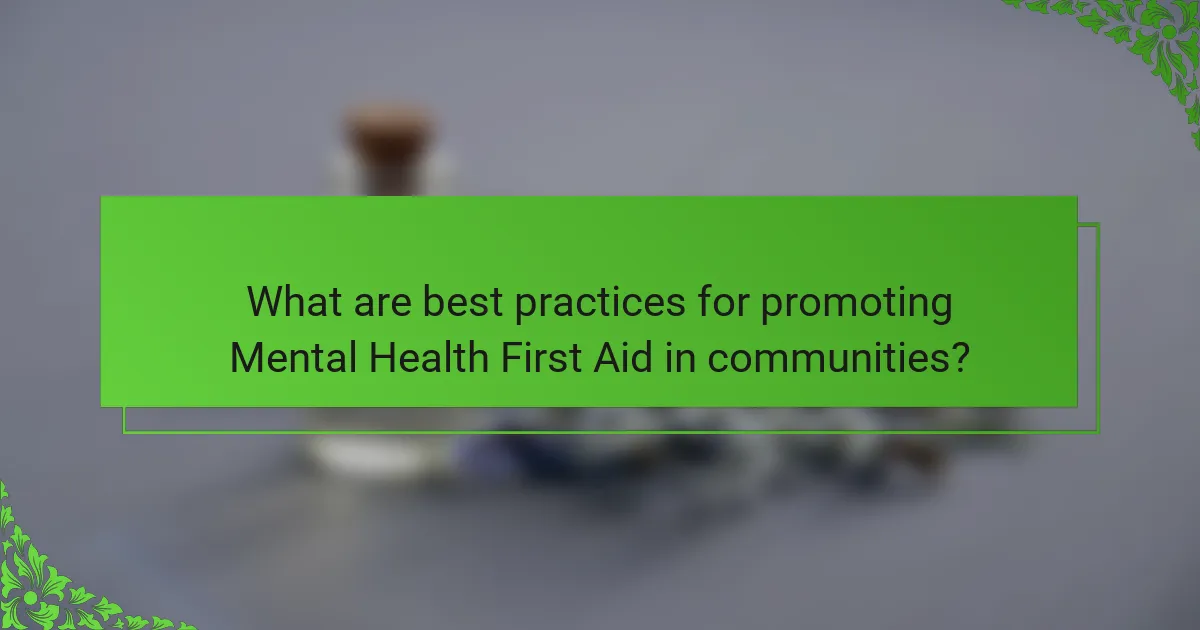
What are best practices for promoting Mental Health First Aid in communities?
Promoting Mental Health First Aid in communities involves strategic outreach and education. Engage local organizations and stakeholders to raise awareness.
1. Conduct community workshops to demonstrate skills and benefits.
2. Utilize social media campaigns to share resources and success stories.
3. Partner with schools and workplaces to integrate training programs.
4. Offer incentives for participation to increase engagement.
5. Create informational materials that highlight mental health statistics and support options.
How can individuals advocate for Mental Health First Aid training?
Individuals can advocate for Mental Health First Aid training by raising awareness, organizing workshops, and collaborating with local organizations. Engaging in community discussions encourages open dialogue about mental health. Promoting the training’s benefits, such as improving crisis response and reducing stigma, can motivate others to participate. Building partnerships with schools and workplaces can further expand access to this vital training.
What strategies enhance the effectiveness of Mental Health First Aid programs?
Training programs that incorporate interactive role-playing and real-life scenarios enhance the effectiveness of Mental Health First Aid. Engaging participants through practical exercises fosters retention of knowledge and builds confidence in applying skills. Additionally, ongoing support and refresher courses maintain awareness of mental health issues. Collaboration with local mental health organizations can provide resources and expert guidance, further strengthening community impact. Evaluating participant feedback helps refine future training sessions, ensuring relevance and effectiveness.
